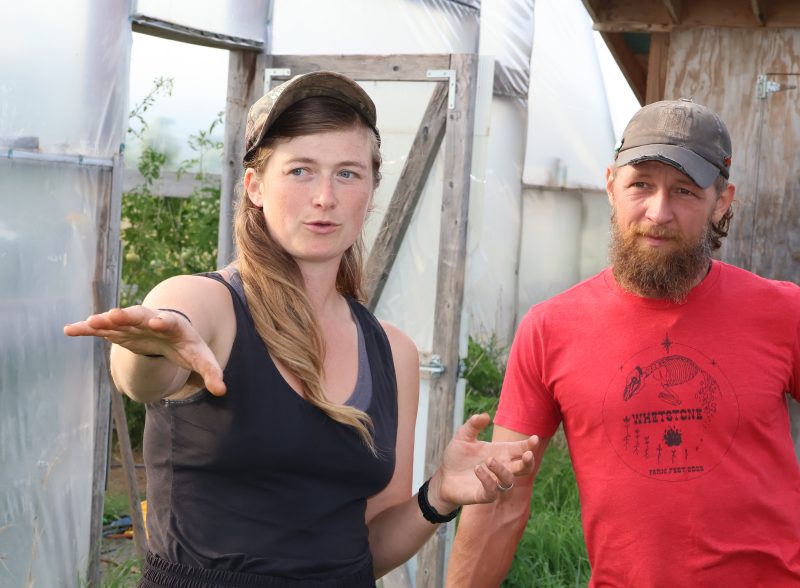Note: This is the 8th installment in the 12-part “A Sense of Where You Are” series.
So, here’s a chicken or egg situation to ponder: when launching a farming operation, when should you approach the local NRCS office about applying for funding to set up infrastructure such as a high tunnel or a rotational grazing system? It might be tempting to apply for an EQIP grant right from the get-go, so when you buy that first herd of cattle, they’re ready to be plopped into the paddocks, where they’ll immediately start turning grass into protein.
Not so fast, say Klaus Zimmermann-Mayo and Emily Hanson. They operate Whetstone Farm, a vegetable and grass-based livestock enterprise in western Wisconsin’s Polk County. Their advice is to first figure out what kind of farming you like to do and what kind of system fits best with the land, resources, and labor available. In other words, determine what kind of context you’d like to set that infrastructure up in.

“We tried to do a lot of things when we first started and had a lot of ideas about what we wanted to do and what farming would look like,” Zimmermann-Mayo said recently while standing next to Whetstone’s old-fashioned barn. “Some things we got more passionate about and got better at and are still doing, and a lot of things we dropped.”
For example, through trial-and-error the couple figured out that raising pigs and chickens didn’t quite work out for Whetstone; a cow-calf beef herd and a flock of ewes were a better fit. Today, besides livestock, they raise vegetables and market the food via CSA, a farmers’ market, and direct-to-eater sales. They launched the farm on 40 acres a decade ago, and recently added another 135 acres. Over the years, the operation has brought together multiple partners and enterprises. It is now run as a collaborative farm consisting of eight adults in total.
Whetstone has benefited from multiple NRCS programs — they used EQIP funds to put in a high tunnel and a rotational grazing system, and receive payments for grazing their livestock in a way that builds carbon, prevents erosion, and keeps water clean.
Hanson and Zimmermann-Mayo shared their experiences with utilizing government conservation programs during an August field day sponsored by GO FARM CONNECT, a farmer-led initiative to build relationships between non-traditional farmers and agricultural support agencies such as the NRCS and Farm Service Agency. Other sponsors of the field day included Renewing the Countryside and the USDA.
The couple led field day participants on a tour of their rotational grazing system as well as their vegetable plots and the high tunnel. The farmers made it clear that this infrastructure didn’t get established right away. Whetstone, for example, didn’t get cost-share funding to put in a high tunnel until Hanson and Zimmermann-Mayo had been on this land for four years.
Brandon Wiarda agrees with this trial- and-error, wait-and-see, approach. He’s a NRCS resource conservationist for Wisconsin’s Pierce, Saint Croix, Polk, Burnett, and Washburn counties. During the field day, he reminded participants that the NRCS’s priority is to fund on-farm projects that help address conservation issues, such as water quality and soil health. That’s why it’s important for applicants to look around their farm and figure out what kind of NRCS-funded infrastructure can help them be more viable economically, agronomically, and environmentally. In a sense, applying for NRCS funds successfully is a bit of a dance that involves matching the agency’s goals with what the farmers want to accomplish. He acknowledged that a lot of beginning farmers get frustrated that the NRCS can’t help fund projects as soon as an operation is getting launched.
“We’re not just helping farmers build up infrastructure from scratch,” said Wiarda. “We need to be solving some existing environmental problem as justification to use taxpayer dollars.”
In the case of Whetstone, the high tunnel has provided a way to raise vulnerable vegetables in a new climate reality.
“We simply couldn’t raise certain crops without the high tunnel,” said Hanson while giving a tour of the structure, which was fragrant with a crop of August tomatoes.
Once a farmer has bootstrapped it a few years and feels ready to commit to a certain kind of production infrastructure, approaching an agency like the NRCS can be worth the paperwork — yes, there’s plenty of paperwork — involved with applying for funding. As Wiarda pointed out, the federal Inflation Reduction Act almost doubled his agency’s budget, and more money is now being earmarked for small and beginning farmers, as well as producers who were historically underserved.
“This is how we want to farm and these programs have made it more doable,” said Zimmermann-Mayo. “The myth of the individual going out and doing it on your own is BS.”
Brian DeVore edits the Land Stewardship Letter and produces the Ear to the Ground podcast.
Give it a Listen
- Ear to the Ground 356: First Things First (Klaus Zimmermann-Mayo & Brandon Wiarda)
Installments in the ‘A Sense of Where You Are’ Series:
- Introduction to the Series: A Sense of Where You Are
- Red Dresses & Magic Management
- In the Blood
- Seeking Signs of Life
- Forest for the Trees
- The Quickening
- Food Bank Booster
- First Things First
- The Big Picture
- The Snowball Effect
- 7 Years Later
- Against the Grain